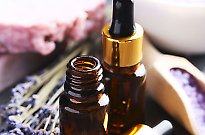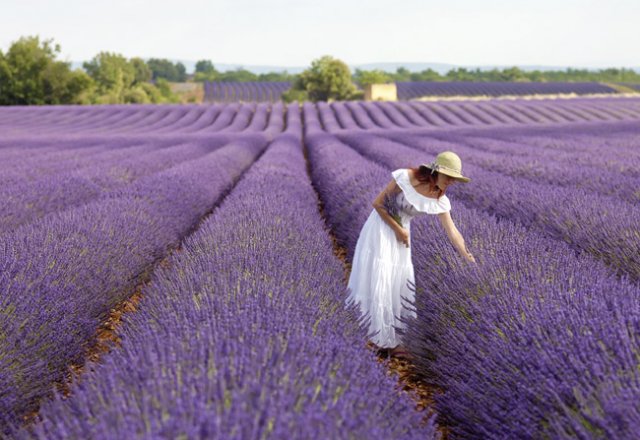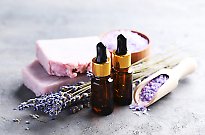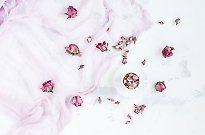
Stress-busting scents

Relieve stress and unwind with essential oils
Discover the healing powers of perfumed essential oils in aromatherapy for combating stress and anxiety, and supporting concentration. Christina Bulbrook writes.
As human beings, our sense of smell is surprisingly acute, especially given how little we are forced to rely on our noses for survival. Not only can our sense of smell trigger memories, it can also be used to promote a number of sensations beneficial for the wellbeing of our minds and bodies.
The term aromatherapy is a modern one and was coined relatively recently. However, its practice – that is, the usage of plant oils and their aromas to improve physical and psychological wellbeing – is not new. The knowledge and use of oils for medicinal, aromatic and religious reasons has been passed from culture to culture for thousands of years, beginning with the ancient Chinese who usedaromatic plants as incense to create harmony. The Egyptians were the first to use oils in preparing their dead, often embalming the deceased using cinnamon, clove and myrrh. The Greeks and Romans also used oils, not to mention those in medieval European cultures who prepared herbal aromatics in an (unsuccessful) attempt to fend off the Black Death.
While aromatherapy may not be enough to ward off fatal disease, essential oils and their aromas have been associated with overall wellbeing, focus and concentration, mood improvements, relaxation and in combating fatigue, headaches, stress and anxiety. In fact, there is recent evidence of essential oils being effective in combating health conditions of varying severities.
Greg Trevena, owner and founder of Essentially Australia, feels strongly about the benefits of essential oils and aromatherapy. “[Essential oils] are more complex,” he says, “and they’re provided by nature.”
Ultimately, for aromatherapy to be effective, the scent must be breathed in. “Sometimes even just a little inhalation straight from the bottle is pretty good,” Trevena says.
On a broader scale, the results of a number of scientific studies have demonstrated aromatherapy’s capacity and potential to be used as a legitimate part of modern conventional medicine.
Lavender
The University of Maryland Medical Centre reports that the use of lavender as an aroma may combat insomnia and other sleep disorders. There is also scientific evidence from researchers at the University of Innsbruck linking lavender to a slowing of the nervous system, which supports relaxation and quality sleep. Another study at the university found that patients suffering pain who were given oxygen with lavender oil reported better pain control than patients who received pure oxygen.
The research is continuing into the power of aromas. Michelle Reeve, aromatherapist and founder of Waterlily Exclusive Spa products says, “The future looks very exciting as interest, education and research grows.” Studies in relation to specific oils, particularly lavender, have demonstrated their positive effects on issues such as stress. “By simply inhaling lavender essential oil for an hour, research has shown that cortisol levels can be lowered by up to 30 per cent,” Reeve says
Cortisol is known as ‘the stress hormone’ and, according to Reeve, “stress and anxiety are the underestimated saboteurs of health and wellness.”
Deciding which oils are best for you is dependent on listening to your body and understanding its needs. “You’ve got to listen to your own moods,” Trevena says. “Sometimes on different days you can go for different oils. The most important message is to go for the oil that you are attracted to. Going for ones which you find attractive are quite often the ones that help you.”
It also depends on what you might be suffering from; certain oils target particular health issues. Lavender is a well-known effective choice of aroma if you are suffering from stress and anxiety, but it is not the only option.
What are the other options?
The best oils from Essentially Australia’s range for combating anxiety and stress include Australian sandalwood, anise myrtle and rosalina, all known for their calming and uplifting properties. “Many oils like frankincense, lavender, geranium and bergamot have a regulating effect on our autonomic nervous systems encouraging a state of balance,” Reeve says.
If you are studying or working towards a strict deadline, try a few drops of rose myrtle or honey myrtle to help provide mental clarity and promote concentration and focus.
“Honey myrtle is calming but uplifting,” Trevena says. “It’s a nice balanced oil for [study] purposes.”
"Citrus rind oils are great skin tonics but also mentally uplifting promoting communication and optimism,” Reeve says. “They also stimulate the limbic system within the brain to promote clarity, learning and emotional connections.”
There are many ways to learn more about aromatherapy and to become involved in the industry. The best advice is to study a course. “Aromatherapy complements many other natural modalities including massage, reflexology, naturopathy and acupuncture,” Reeve says. “Aromatherapy diploma courses explore the chemistry behind the oils along with therapeutic indications and applications and anatomy and physiology of all body systems.
“Career opportunities exist in aged care facilities, women’s health, pre and post natal care, product development, day spas, beauty therapy, community health, medical research and natural medicine practices.”
With such diverse career options, choosing a course (not unlike choosing oils) depends on your own goals and needs. These five courses above from various educational institutions are of varying lengths, study options and topic areas, giving you a flexible range of options. Just don’t forget your honey myrtle oil to maintain your mental clarity and calm.
You might like: Aromatherapy recipes or Simple steps to living stress free


